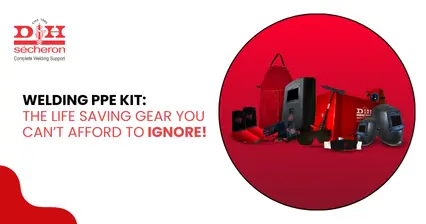An In-Depth Exploration of Low-Alloy Steel: Your Comprehensive Guide for D&H Sécheron
Introduction
Steel is an essential material in the world of engineering and construction, known for its strength, durability, and versatility. But did you know that not all steel is created equal? Low-alloy steel, a subset of this remarkable material, offers unique properties and advantages that make it a preferred choice in various industries. In this comprehensive guide, we will dive into the world of low-alloy steel, exploring its properties, types, advantages, and real-world applications, all while highlighting D&H Sécheron's expertise in the field.
Types of Alloy Steel
Low-alloy steel is a type of steel that contains small amounts of alloying elements (other than carbon) such as chromium, nickel, molybdenum, and manganese. These alloying elements are added to enhance specific properties of the steel, such as strength, toughness, and corrosion resistance.
Low-alloy steel can be categorized into several types based on the alloying elements and their proportions. Some common types include:
Chromium-Molybdenum Steel
This type of low-alloy steel contains chromium and molybdenum, making it exceptionally strong and heat-resistant. It's commonly used in applications like pressure vessels and pipelines.
Nickel-Chromium Steel
Nickel-chromium steel offers excellent corrosion resistance and is often used in the chemical industry, where resistance to corrosive chemicals is crucial.
Manganese Steel
Manganese steel is known for its high impact resistance and is commonly used in mining equipment and rock crushers.
Advantages of Alloys
Alloying low-alloy steel with various elements imparts several advantages:
Increased Strength 🡪 withstands heavy loads and high-stress conditions
Improved Toughness 🡪 suitable for applications where impact resistance is essential
Enhanced Corrosion Resistance 🡪 extends the lifespan in harsh environments
Heat Resistance 🡪 withstands elevated temperatures
Alloy Steel Properties
Low-alloy steel exhibits a range of properties that make it a versatile material in various industries:
Strength: Low-alloy steel offers high tensile and yield strength, making it suitable for structural components and load-bearing applications.
Ductility: It can be easily molded and formed without losing its structural integrity.
Machinability: Low-alloy steel can be machined and fabricated with relative ease, allowing for precise manufacturing.
Weldability: Welding low-alloy steel is generally straightforward
Examples of Low-Alloy Steel Applications
Low-alloy steel finds extensive use in a wide range of industries and applications. Some notable examples include:
Aerospace: Structural components in aircraft and spacecraft benefit from the strength and weight-saving properties of low-alloy steel.
Automotive: Low-alloy steel is used in the manufacturing of car bodies, engine components, and suspension systems, improving vehicle durability and safety.
Construction: Structural steel used in building construction often contains alloying elements to enhance strength and load-bearing capacity.
Energy Sector: Low-alloy steel is used in pipelines, power plant components, and pressure vessels to withstand high temperatures and pressures.
Conclusion:
Low-alloy steel is a remarkable material with diverse applications across various industries. Its unique properties and advantages make it a preferred choice for critical applications. D&H Sécheron's expertise in welding materials further ensures the integrity of low-alloy steel components in these industries. As technology advances and industries demand ever-stronger and more durable materials, low-alloy steel will continue to play a crucial role in shaping our world.
11 May 2025 | Welding
Nagpur - Bori - Tuljapur Road MSH-3 in Yavatmal District (Maharashtra)
11 May 2025 | Welding
Guidelines to Understand Gas Welding: Applications, Advantages & Disadvantages
11 May 2025 | Welding
3 Tips for Finding the Best Mild Steel Electrode for Your Application
11 May 2025 | Welding
How to Select the Right Welding Filler Wires for Stainless Steel Welding?
11 May 2025 | Welding
Building the Narendra Modi Stadium with Norma V and Autotherme-1 Electrodes
11 May 2025 | Welding
Low Alloy Steel Welding in a (PEB) Pre Engineered Building Structure
11 May 2025 | Welding
Welding Rods: Different Types and Tips for Properly Storing and Handling
11 May 2025 | Welding
Tips for Flawless Welds with Stainless Steel Electrodes: Pros and Cons
11 May 2025 | Welding
Exploring Applications and Benefits of Stainless Steel Welding Electrodes
11 May 2025 | Welding
Welding Basics: Joining Metals with Heat and Pressure - A Beginners Guide
11 May 2025 | Welding
Distinguishing Low-Alloy Steel from High-Alloy Steel: Understanding the Variations
11 May 2025 | Welding
Hard Facing Wire - Understanding the Process and Achieving Optimal Result
11 May 2025 | Welding
Exploring the Advantages of Stainless Steel Electrodes in Welding Applications
11 May 2025 | Welding
Weathering Steel vs. Traditional Steel: A Comparative Analysis of Performance
11 May 2025 | Welding
Choosing the Right Welding Rod: Why 6013 Electrodes Might Be Your Ideal Option
11 May 2025 | Welding
Why 7018 Electrodes Are Preferred for High-Strength Welds in Pipeline Construction
11 May 2025 | Welding
Filler Wire vs. Stainless Steel Filler Wire: Understanding the Key Differences
11 May 2025 | Welding
Exploring the Impact of Filler Material on Welding Quality and Durability
11 May 2025 | Welding
Choosing the Right Cast Iron Electrode for Different Welding Projects
11 May 2025 | Welding
Top Advantages of Cast Iron Electrodes for Industrial Welding Applications
11 May 2025 | Welding
Key Benefits and Challenges of Using TIG Welding in Industrial Projects
11 May 2025 | Welding
5 Reasons Why 7018 Electrode is the Gold Standard for Welding Professionals
11 May 2025 | Welding
Top 5 Advantages of Flux Cored Arc Welding for Heavy-Duty Applications.png)
11 May 2025 | Welding
Lotherme-601: A Game-Changer for Restoring Shoulder Pins in Heavy Machinery
11 May 2025 | Welding
How D&H Sécheron Helped Repair a Rotary Kiln’s Cooler Section with LoTherme 352
11 May 2025 | Welding
Piston Repair for Mining Industry: Cost-Effective Solutions with LoTherme 468.webp)






.jpg)








































.jpg)
.jpg)

.jpg)

.jpg)





.jpg)
.jpg)
.jpg)



.webp)
.jpg)
.jpg)
.webp)
.jpg)






















.png)



.webp)

.webp)
.webp)



